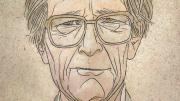John Rawls is to modern political philosophy, perhaps, what John Maynard Keynes is to economics. Many Harvard students and graduates will remember his 1971 work A Theory of Justice, mandatory reading in Bass professor of government Michael Sandel’s “Justice,” and in a number of philosophy and intellectual-history courses. Rawls famously posed the “original position,” a thought experiment in which people must decide how they would organize their ideal society without knowing what social position they will hold in it: rich or poor, man or woman, majority or minority. The late Conant University Professor trained some of the most influential philosophers in the world today. But he, and the nuances of his work, are also widely misremembered, argues assistant professor of government and social studies Katrina Forrester. Her forthcoming book, In the Shadow of Justice: Postwar Liberalism and the Remaking of Political Philosophy (Princeton University Press), excavates the complex history of Rawlsian thought, showing how his work remade political philosophy, and how philosophers today grapple with contemporary problems in Rawls’s shadow.
To understand Rawls’s impact, it’s important to understand the state of political philosophy before him. He started his doctorate in 1946, just after the war against Nazi totalitarianism had cost millions of lives and destruction worldwide, and left Eastern Europe under Stalinism. Political thinkers were concerned about state control over people’s lives, and skeptical of government expansion. They focused on restraining state power, not imagining the good that government could do for people.
With Rawls, that all changed. “Rawls completely transformed how political philosophy was done, and the kinds of questions philosophers asked,” says Forrester. He “showed that philosophy, which had been hard hit by the war…, could be ambitious and dream big,” she continues. “He made political philosophy about finding the right conception of distributive justice—of who gets what. After Rawls, that’s what philosophers focused on—not on other questions of order, stability, legitimacy, revolution, transformation, domination, oppression. They asked questions about distribution and redistribution—about…how to limit social inequality and how to justify inequalities that existed.”
Although Rawls represented a departure from his time, a thinker who enabled the field to emerge from the shadow of World War II, Forrester argues that it’s also crucial to understand him as a product of that period. In his early, unpublished writing from the 1950s, held in Harvard’s archives, he shares “a skepticism of the state with anti-statists, who opposed the expansion of the state that came with the New Deal and the Second World War,” Forrester explains. “He emphasizes that government should leave people alone and not control their lives, except insofar as it has to provide the minimum necessary for them to have a fair chance in life.” The purpose of the state was to enforce a minimal set of rules, like contracts and traffic laws; the government as “umpire” was a popular metaphor among liberals at the time. Young Rawls cared more about protecting property rights, Forrester noted in a lecture, than “active redistribution by a planning state.”
This matters, Forrester says, not just because “the most influential political philosopher of the late twentieth century isn’t always who we think he is,” but also because it displays just how different today’s political reality is from that of Rawls’s era: “The main worry for many liberals then was the expanding state; today it’s the weakness of the state in the face of the dominance of corporations.” Although Rawls came from a tradition that was wary of government, Forrester notes, “today his moderate schemes for redistribution...look very radical….This in itself shows how far to the right our politics has moved since the mid twentieth century.”
Much of In the Shadow of Justice turns on this final point: on how effectively or not Rawlsians have responded to neoliberalism, the loose concept that describes the rise of privatization, austerity, and deregulation all over the world since the 1970s. “Rawls himself grew quite worried about the rise of marketization,” Forrester says. Her analysis deftly makes sense of what might seem to a lay reader to be a paradox of the Rawlsian revolution. If Rawls was one of the most influential thinkers of the last century (Forrester notes that he “had a substantial influence on professional elites, from lawyers to policymakers”), then why have his social-democratic ideas remained so marginal in actual politics?
Part of the answer, she writes, is that “much debate [in political philosophy today] still takes place in the shadow of a set of ideas that reflect the assumptions of a different age.” Concretely, she says, this means that “in the 1960s when the liberal philosophers who made Rawls essential reading at all universities came of age, the assumption was that the civil-rights movement would bring racial equality and desegregation. Things were getting better—and the reformism at the heart of political philosophy reflected that. Today, it’s not at all clear things are getting better.” Societies face climate change, increasingly short-term and precarious types of work (see “How U.S. Companies Stole American Jobs” July-August 2017, page 10), “as well as new and persistent forms of inequality. Our questions are also different: the political and economic instability that has followed the financial crisis of 2007-08 means that the worth of capitalism and the possibility of socialism are on the political agenda in ways they haven’t been for decades.” The Rawlsian tradition hasn’t provided a path to realizing its goals of redistribution, and in an age of dramatic inequality, Forrester says, that is no longer enough. It also has little to contribute to newly urgent questions, such as the future of work, which has been unsettled by radical shifts in contingent labor and automation. “Should we characterize the data we provide to Facebook as a form of work?” Forrester asks. “What do philosophers think of as the big political puzzles of our time? The answer should not be the same as ‘what Rawls thought.’”









